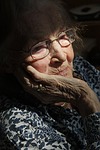The most common types of dementia is Alzheimer’s Disease. Typical symptoms include memory problems, difficulty finding the right words, confusion, mood swings, communication problems and difficulty carrying out everyday activities.
The second most common type of dementia is vascular dementia which is caused by blood flow to the brain being reduced because of a stroke. Symptoms depend on which area of the brain has been affected but can include becoming slower in thinking, disorientation, difficulty in finding words, memory problems, becoming more emotional, difficulty in walking or a change in the way the person walks.
The communication difficulties that can come with these types of dementia can be helped by a speech and language therapist who can offer strategies and techniques to reduce the confusion and challenges of the disease.
“Mum got very confused about days of the week sometimes and times of the day.”
Through the Alzheimer’s Society website Marlene Brooks tells her story of how vascular dementia affected her mum and how a diagnosis brought relief and help for her family.
“It’s never easy to learn that your parent or loved one has dementia but for us it also brought a kind of relief. I knew there was something not quite right while my dad was still alive and through his cancer, dad also had an idea too. When I spoke to people about it they said:
‘Maybe she is tired and worried looking after your dad’.
“Then dad died and the strange things that mum did and said was put down to bereavement. I used to get frustrated as no one seemed to know where I was coming from. I have known bereaved and worried people in my life and this was something very different. I heard about the Alzheimer’s Society and decided to give them a call. From that first call I felt such a burden being lifted at not being fobbed off, someone listened, someone cared and I didn’t feel alone with my doubts and concerns. I was sent some literature which I kept, but it was still to be a long while before anyone would listen. Then mum was taken into hospital after a fall that had left her lying on the kitchen floor all night. She had taken off her Careline fob to have a wash and forgot to put it back on so was unable to alert anyone.
To cut a long story short, during mum’s stay in hospital she was diagnosed with vascular dementia. At last. Frightening though this was to learn, it was also to be a turning point for my brother and me in getting more help for mum. I got out the literature from a while back and we rang the Alzheimer’s Society for further advice. From then on we have had so much support. A member of staff at Harlow branch helped us fill out the forms needed to get mum financial help and also an automatic council tax reduction. This then meant mum could have carers come in to release my brother and me to work and look after our immediate families too. Mum had someone from Alzheimer’s visit her, and mum herself said it is like having a friend come to visit. Many of mum’s friends and also all of her siblings have died so for her to have such a special lady visit has meant the world to her. Some days were worse than others.
Mum got very confused about days of the week sometimes and times of the day but with help and suggestions from the people who have become our friends at the Alzheimer’s Society in Harlow we get by a day at a time and it improved mum’s quality of life so much. Mum became a great grandmother for the second time and I am sure that it is through all the help and support she received that most of the time she still enjoyed her great grandchildren and life in general. She had never been one to join in clubs and events but even mum had been encouraged and enjoyed some social events organised by the Alzheimer’s Society including the Christmas parties that were held each year.
We as a family are very grateful for everything and for making it possible to have the mum and nan we all know with us a bit longer. When the bad times come as they do, we are so glad to know all that we do, so that we can ride it out and in turn help her through the scary times. Dementia is a dreadful illness, the slow dying of the brain a bit at a time but it helps so much to know we aren’t alone. Time passed and it has been 11 years since I first contacted Alzheimer’s Society for advice and sadly mum passed away in April this year and her last months were not good due to recurring pneumonia and many visits to the hospital as a result but because of all of the support and back up mum was able to continue to live at home until a month before her death when she slipped quietly from this world into the next, which is what she always wanted.”
See next week’s posts for more information on how dementia can affect a person’s ability to communicate.
To read more real life stories go to: www.alzheimers.org.uk
Written by Rachel Harrison
Speech and Language Therapist
On behalf of Integrated Treatment Services
www.integratedtreatmentservices.co.uk
May 2014
Image rights – www.pixabay.com










